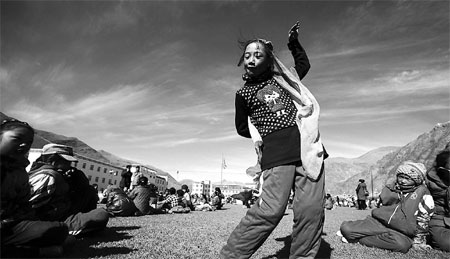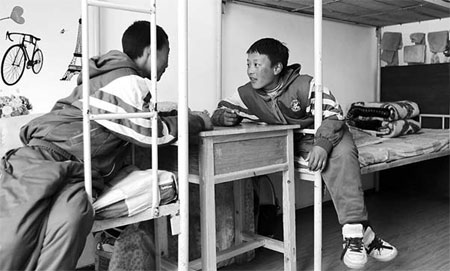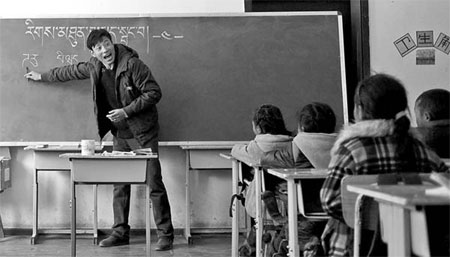Chinese school rebuilt with African aid
Updated: 2013-03-28 07:14
By Hu Yongqi in Yushu, Qinghai Province (China Daily)
|
||||||||
|
A Tibetan girl dances on a playground at the China-Congo Friendship Primary School, which was built with the help of an investment of 16 million yuan ($2.57 million) from the Republic of Congo. Photos by Wang Jing / China Daily |
|
Two Tibetan students chat in a dorm at the China-Congo Friendship Primary School on March 15. |
|
A teacher gives a lecture featuring Tibetan language at the China-Congo Friendship Primary School, which was rebuilt after an earthquake in April 2010. |
In Chindu county, Qinghai province, the late-March sunlight was stronger than in many other parts of China. The dazzling sunbeams reflected from the dormitory's wooden floor onto the white walls, making the room at the China-Congo Friendship Primary School even brighter.
During the midday break, Sonam Rinli climbed onto his bunk bed and glanced at the photos of his favorite TV stars pinned to the wall. He dipped into the pages of a favorite non-school book about science before taking a rest. The 14-year-old student lives in the new dormitory at the school, which was built with a donation of 16 million yuan ($2.57 million) from the Republic of Congo.
For Sonam Rinli, everything is new and exhilarating. "The wooden floor shone amazingly from the first moment we moved into the new dorm. The canteen and library are also remarkably good," he said.
In a separate room, Sonam Rinli's brothers were also taking a break. The three boys transferred to the school from a primary school in the Chindu county seat two years ago, a move that relieved their mother of a heavy financial burden. The brothers now have peace of mind and can devote themselves to their studies along with their 300 peers without having to worry about tuition fees or daily expenses, which are now covered by the government.
Two-thirds of the school's students are orphans, as befits an institution originally founded as a place of education for children without parents. The rest, Sonam Rinli and his brothers included, come from single-parent or economically disadvantaged families, according to the Chindu Bureau of Education.
The school, covering 42,625 square meters, is seven times larger than its predecessor, which was badly damaged in an earthquake in 2010. Five new buildings, including a library and a computer room, have been erected, along with a soccer field and a basketball court. When the bell rang to signal the end of class, the students gleefully rushed to the playground to play basketball or perform traditional Tibetan dances.
The scene was very different before July last year, when construction of the new buildings was completed. The children were housed in tents and often spent their leisure time wandering aimlessly around the site because of the lack of amenities. When decorative work finally ends in August, the school will receive another 150 students.
Experts said China has a reputation for helping African countries with infrastructure projects and donations, but this school, on the Qinghai-Tibet Plateau, has reversed the trend and is seen as a symbol of the close ties between China and Congo.
Mutual support
In April 2010, a 7.1-magnitude earthquake devastated the Yushu Tibetan autonomous prefecture that administers Chindu, leaving seven schools wrecked, but fortunately causing no injuries to students. On his visit to the quake's epicenter, then-president Hu Jintao wrote: "We will have new schools and reconstructed homes" on a blackboard at one of the schools in Jyegu township, the home of the prefectural government.
Three buildings at what was then called Wenle Primary School, the original name of the China-Congo Friendship Primary, were badly damaged, and resulted in 54 teachers and 300 students spending a frozen winter in tents. "Two girls and a female teacher lived in each 'female' tent, while eight boys squeezed together in each 'male' tent, because we only had a limited number," said Principal Kunga Jamyang.
When he attended the Shanghai World Expo in April 2010, Denis Sassou N'Guesso, president of the Republic of Congo, expressed his country's wish to build a primary school in the quake-hit area. A statement from the Qinghai Department of Education said China initially suggested that Congo provide a less expensive donation for fear of overburdening the African country. However, at the Congo's insistence, Qinghai finally decided to accept the generous assistance, according to the statement.
"Although our economic capacity is limited, we should extend help," said Basile Ikouebe, the Congolese foreign minister at a ceremony to celebrate the completion of construction work in July 2012, quoted by the Xinhua News Agency.
Ikouebe said the support was a reciprocal gesture after China offered the African country a great deal of support in areas such as repairing roads. The Congo has enjoyed an enduring and close partnership with the world's second-largest economy since diplomatic ties were established in the 1960s. In 2008, Congo donated $1 million to areas affected by the devastating Wenchuan earthquake in Sichuan province. In total, sub-Saharan countries donated $11 million after the earthquakes in Wenchuan and Yushu.
Congo offered help when the Chinese people were in dire need, and would donate again if China is confronted with a similar situation, said Daniel Owassa, the republic's ambassador to China, in an exclusive interview with China Daily. "We can't wait around and only offer a helping hand once we are wealthy."
Herding and farming accounts for 80 percent of Chindu county's economy, with many kids conforming to the ancestral lifestyle by raising yaks, animals synonymous with the plateau.
"In remote villages, education is likely to be one of the best ways to change the children's destinies, and the new school definitely gives them a better chance of achieving that goal," said the principal.
Although most of the students don't know the exact location of Congo, they are grateful for the kind donation that has given them access to advanced facilities, said student Tsering Lhamo, 13.
'Feels like home'
Because of the ongoing reconstruction work, the roads of the county seat of Chindu are rough and rugged, leaving pedestrians gasping for breath in the dust clouds raised by passing cars. However, just 4 kilometers to the west, the new China-Congo Friendship Primary School is surprisingly neat and clean.
In the dormitory, quilts and blankets were rolled up in orderly fashion on the beds, and toothbrushes and towels occupied the spotless shelves. At 12:40 pm, students stepped out of the classroom for lunch, the younger children at the front of the line.
They lined up to wash their hands before collecting - their food, meat and two types of vegetables - from the cafeteria. The students have been taught to be polite, so the younger kids receive their rations first. Some giggled nervously, overcome with shyness at the sight of strangers.
The reconstruction of 44 schools in Yushu, seven of them in Chindu, was completed at the end of last year. Freezing winter temperatures and the difficulties of working at high altitude restricted building work to just six months, according to local residents. Because the summer months offer the best working conditions, construction began in June 2011 and was completed 13 months later.
"The altitude means people from other areas cannot work on a construction site, and a shortage of local labor meant the construction work progressed at a slow pace," said Han Yonghong, director of the teaching and research office at the Chindu education bureau.
Han said the high price of labor resulted in the school costing much more than other projects in the region. Years ago, a skilled worker earned less than 100 yuan a day, but a surge in demand for workers has pushed up the price and many laborers charge more than 300 yuan for a day's work.
Chindu, though primarily a herding and agricultural area, has a good reputation for basic education. In the last decade, the county has been top of the six in the prefecture in terms of sending high school students to college, said Sodwang Nyima, director of the Chindu Bureau of Education.
Last year, the county spent 54 percent of its fiscal revenue of 7.8 million yuan on increasing teachers' salaries and improving facilities at the schools, according to the bureau. Principal Kunga said he is paid 7,000 yuan per month, more than double the wage of a primary school principal in neighboring Sichuan province.
The China-Congo Friendship Primary School was originally founded in 2004 when former county head Baisges Tashi visited the remote areas of Chindu and found that many orphans were not taken care of after school even though they were included in the compulsory education system. The county head raised the funds to build a school for orphans, and named it Wenle Primary School, which means "Gaining knowledge in pleasure".
Five years ago, Sonam Rinli's father was killed in a car accident, leaving his wife to raise four children on her own. Having received only a scant education, the 30-year-old widow resorted to laboring, carrying building materials on construction sites and earning just 20 yuan a day.
The experience made Sonam Rinli and his siblings acutely aware of the value of money: While their peers were able to pay 1 yuan to buy steamed bread for breakfast every day, the boys would make do with porridge and homemade pickles.
"Even though the compulsory education system didn't charge us, the 600 yuan my mother had to pay for our daily school expenses weighed on her so badly," said the boy.
Two years ago, he and his younger brothers transferred to the new school where they receive free education and a monthly subsidy of 185 yuan each, paid by the central government, to cover living expenses, relieving their mother of the burden.
A water shortage means many students are unable to wash themselves or their clothes regularly, so the school has arranged for the students to wash their hair and feet every Saturday afternoon, Jamyang said.
"Our job is to raise the students as if they were our own children. Many of the teachers give lectures in the classroom and then play the role of a parent after class," he said.
"It feels like home here. My dream is to enroll at a prestigious university and then find a satisfactory job. That will provide a comfortable life for my mother and allow me to donate to charity when I have the spare money," said Sonam Rinli.
Qin Zhongwei contributed to the story.
(China Daily 03/28/2013 page4)

 In Photos: 7.0-magnitude quake hits Sichuan
In Photos: 7.0-magnitude quake hits Sichuan
 Li Na on Time cover, makes influential 100 list
Li Na on Time cover, makes influential 100 list
 FBI releases photos of 2 Boston bombings suspects
FBI releases photos of 2 Boston bombings suspects
 World's wackiest hairstyles
World's wackiest hairstyles
 Sandstorms strike Northwest China
Sandstorms strike Northwest China
 Never-seen photos of Madonna on display
Never-seen photos of Madonna on display
 H7N9 outbreak linked to waterfowl migration
H7N9 outbreak linked to waterfowl migration
 Dozens feared dead in Texas plant blast
Dozens feared dead in Texas plant blast
Most Viewed
Editor's Picks

|

|

|

|

|

|
Today's Top News
Live report: 7.0-magnitude quake hits Sichuan, heavy casualties feared
Boston suspect cornered on boat
Cross-talk artist helps to spread the word
'Green' awareness levels drop in Beijing
Palace Museum spruces up
First couple on Time's list of most influential
H7N9 flu transmission studied
Trading channels 'need to broaden'
US Weekly

|

|










